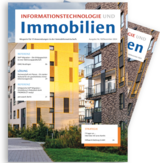Artificial Intelligence – Why you should pay special attention to this new technology

Why artificial intelligence?
The most interesting overarching question on the topic is currently which fields of application for artificial intelligence give us a real advantage. Where does it save us time and effort or provide us with additional benefits? The real estate industry has recently also discovered its interest in such issues. The market has gotten curious. After gradually experiencing artificial intelligence more and more in their everyday lives, people have come to the conclusion that this still young subfield of computer science can generate very practical benefits for us. We distinguish between two different application areas. On the one hand, there are scenarios in which this new technology replaces existing ones. It is important here to focus on the end user’s needs when determining whether it makes sense to replace an existing technology at all. Does the new technology grant the user a clear advantage or do I want to replace the existing one with AI as an end in itself? Sure, you can replace the search template of a real estate portal with a chatbot controlled by artificial intelligence. But why? A function that end users already find good and useful should get a makeover at most, not a complete reinvention. On the other hand, there are application areas for which artificial intelligence opens up completely new avenues. This does not entail replacing something old, but creating something entirely new. One prime example is the invention of the Internet search engine. It’s hard to imagine that almost 20 years ago, books with website recommendations existed as reference works for navigation through the Internet.
Now let’s take a very specific look at the real estate industry. What are realistic application scenarios for us? What is PROMOS already working on and which futuristic concepts will soon be all-time favourite technologies?
Quick verification with automatic facial recognition
In order to access the services of easysquare apps as a private user, it may be necessary to verify yourself first, e.g. as an actual tenant before using the housing company’s easysquare tenant app. Of course, after downloading the app, users would like to have immediate access to all functions. After all, they must have downloaded the application for a reason. A lengthy registration and verification process may well be the first reason to not bother taking advantage of the app. Simplifying this process is therefore not only useful, but urgent. Modern verification systems use intelligent image recognition mechanisms for this purpose. Using pictures or a short video, a program checks whether the person in front of the camera matches the person on the identification document – at any time, day or night. This is an advantage for the user, but also for the employees of the housing company, who no longer have to perform the manual checks. We are already working together with a specialist provider on the concrete implementation.
Hello, how can I help you – the concierge function
An AI-controlled concierge function could offer the user an additional benefit. Imagine you want to visit someone at hospital. You’re welcomed by a confusing jumble of signs and arrows pointing to different buildings with countless corridors and identical doors – as an infrequent visitor, it’s almost impossible to find your relatives on your own, isn’t it? Clearly, you first make your way to the information desk. You ask for the room number and immediately receive directions to the right ward. How convenient! A concierge like this is just as useful for occasional users of an app. Thanks to artificial intelligence, the user can ask for a certain function via voice input and receive an audio response with the relevant information from the digital concierge. This is similar to popular applications like Siri, Alexa or Cortana. It enables users to find their way around – even if they only use the app every few months.
The talking exposé – customised information at the click of a button
A prospective tenant is characterised by a specific profile. A single person in their mid-thirties naturally has different search criteria than a family of three with a dog. While one highly values the diverse restaurant scene right around the corner, the other is more interested in playgrounds, schools and calm streets. In order to get ahead of any questions and give a wide-ranging impression, the property exposé is usually detailed and extensive. For individuals, however, this means a wealth of information that is largely irrelevant to them personally in many cases. We see this as an ideal application for chatbots. Potential tenants can simply ask the exposé for their individual needs. The exposé responds quickly and accurately thanks to artificial intelligence. We are already discussing a prototype of the “talking exposé” with customers. This is already a realistic scenario that can be put into practice with current state-of-the-art technology.
First image, then text – intelligent defect recognition
Solutions such as the easysquare craftsmen portal, defect reporting or the solution for quality management and legal safety regulations use a photo function to accurately document the actual situation on site. It is now conceivable here to reverse the process. The user does not begin with the written defect report, but by taking a photo. An AI-based evaluation logic then recognises a broken window pane or a dripping tap, for example, and can then automatically pre-fill certain parameters for subsequent data processing. The relevant situation is thus recognised independently, which saves the processor a significant amount of time when filling out the digital forms.
Summary
The example application fields described here are by no means still distant future scenarios. These are very concrete and, above all, convincing application possibilities that we are already seriously discussing with a few of our customers today. Artificial intelligence is already a part of our lives. Users quickly get used to the convenience of intelligent technologies and are especially enthusiastic about the added value. It is therefore important for us, as solution visionaries, to deliver our customers precisely such value. We don’t want to do good things differently, but create new things that truly benefit the user.
Author:

Jens Kramer
CEO
PROMOS consult
Other articles by this author:
- Article "Property management is cloud capable"
- Article "The PC is becoming obsolete"
- Article "Making short work of minor repairs"
- Article "The digital transformation – an opportunity for the housing industry"
- Article "Fast, mobile, user friendly – digital solutions for the residential property business"
- Article "Artificial Intelligence – Why you should pay special attention to this new technology"


